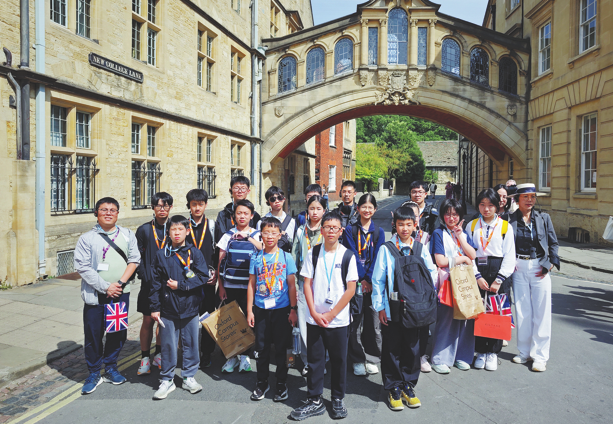UK finds favor from China's summer students
Looking at safety, academic outcomes and future prospects, Chinese parents are increasingly sending their wards to British institutions after a pandemic hiatus, Wang Mingjie reports from London.


Chinese students are once again filling the halls of British boarding schools and university campuses, as families across China re-embrace UK summer camps — but there's a marked shift in their mindset compared with that before the pandemic.
Once seen as a cultural "bonus" or language immersion experiment, these two-week long overseas programs — usually held in July or August, when the Chinese students have their summer vacations — are now carefully selected, strategic investments. Parents are prioritizing safety, academic outcomes and future value, reflecting a broader shift in how Chinese families approach international education.
While the United States once dominated the summer camp landscape, concerns over visa restrictions and rising geopolitical tensions have driven many families to turn toward the United Kingdom — a destination increasingly viewed as stable, prestigious and practical.
"Last year, a parent asked me 'if participating in a UK study abroad program would be helpful for applying to foreign schools in the future'," said Liu Deqiang, founder of Ardmoor Education Technology in Shanghai. "In the past, students were more concerned about cultural experiences and language environments, but now academic depth has become the primary goal."
Liu's company has been working with public and private schools in Shanghai since 2017, taking Chinese students to the UK for summer programs. "The school will set goals for the summer camp program and what they hope students can gain from it," Liu explained. "They propose learning objectives; we design and deliver customized summer camp programs."
Following a pandemic-induced hiatus, Liu expects strong growth ahead. "I foresee a significant increase in Chinese students choosing UK summer programs in the coming years," he said.
Liu said families' approach toward these summer courses is more cautious of late, shifting from "worth trying" to "must be effective". "Traditional tourism projects are giving way to hardcore content such as financial simulations and scientific research practices," Liu said. "The demand for STEM (science, technology, engineering and mathematics) projects has surged by 120 percent year-on-year."
The changing trend is also evident at UK-based institutions. "We've seen a marked increase in summer camp groups from China after the pandemic," said Michelle Mi, managing director of UK Education Insight, a Leicester-based educational consultancy. "It's driven by pent-up demand, rising household spending power and a growing recognition among Chinese parents that these camps help build global competencies."
Her organization continues to draw students through Chinese partners, schools and education agencies — and demand has not only recovered, but evolved. This year her team is running two camps — a London Academy of Music and Dramatic Art-themed public-speaking program and a group organized in collaboration with Qingdao Yinhai School, in Shandong province.
"UK camps now blend safety, prestige and measurable outcomes — transitioning from 'fun experiences' to 'strategic stepping stones for long-term UK education'," she said.
"Our camps offer measurable value, like speech competition seeding or portfolio enhancement for UCAS (Universities and Colleges Admissions Service) applications. They're no longer just fun — they're functional."
Darrell Barnes, brand development director at Malvern College International in England, shared a similar observation. "Language and leadership are definite draws, especially programs like our Harvard Learn with Leaders initiative," he said. "Cultural exposure is less of a priority — the Chinese students tend to mix less than some other nationalities — but academic-based activities keep them motivated."
Chinese students have long looked to both the UK and the US for short-term and long-term study opportunities, but the post-pandemic landscape has shifted.
"The summer camps in the UK and the US have always been favored by Chinese families," said Liu. "But visa restrictions and broader geopolitical tensions have directly prompted families that originally planned to send their wards to the US to turn to the UK." The UK's "moderate diplomatic stance and historical ties with China have helped reassure families", Liu explained. "It's seen as a 'safer, zero political interference alternative'."
Mi noted that short-term UK programs have gained traction because of "visa stability, perceived safety and reciprocal cultural initiatives". While demand for the US might increase if restrictions ease, the UK currently enjoys a clear advantage, she said.
For some families, the decision is driven by personal criteria. "When making this decision, safety and the local political environment were my top priorities, as they are directly related to my child's well-being. This must come first," said Xiang Siqi, a parent from Changsha, Hunan province.
"For this reason, I tend to choose programs in developed countries and regions, which are generally more secure in these aspects."
She said: "The main reason behind sending my child to a summer program in the UK is to encourage them to step out of their comfort zone and experience different cultures and lifestyles. This will help broaden their international perspective and gradually develop independence through interacting with peers from other countries and handling daily matters on their own."
The experience often leaves a lasting impression on students. Huang Bingjingyi, a high schooler from Changsha, said she joined a UK summer program out of a passion for English — and Sherlock Holmes. "I wanted to see where Sherlock Holmes came from," she said. "I also knew that the English spoken in England is the purest."
In class, Huang was placed with international peers and encouraged to speak and collaborate. "At first, I didn't understand everything. But by observing people's expressions and the context, I was able to figure things out," she said.
Huang added that the teaching style involving demonstration, discussion and creative output was very different from that in her Chinese school and something she thoroughly enjoyed.
"Compared with schools in China, there were fewer textbook classes and more hands-on activities. It made me more confident, and I even made foreign friends."
Although she struggled with homesickness and physical discomfort in the early days, she described the overall experience as transformative. "It planted in me the germ of wanting to study abroad," she said.
Growing appeal
Susan Fang, founder of educational consultancy OxBridge Holdings, said multiple factors are behind the UK's growing appeal. "Many UK schools now let international students join just before term ends, sitting in an actual lesson and joining in with British pupils. For Chinese parents, this feels more 'authentic'."
While the US once held a strong lead in tech — and sport-heavy camps, Fang said UK programs tend to appeal through structure, safety and a focus on arts and humanities. "There's also a much stronger emphasis on structure. The UK takes safeguarding minors seriously …which suits the Chinese preference for linear, structured education."
Julian Fisher, a senior partner at Venture Education in Beijing, echoed this trend: "Now that students aren't studying English after school in China, many families see the summer camps as a golden opportunity to get full immersion. And, generally, the best place to do that is overseas, in an English-speaking country.
"China is going global," he said. "Operating comfortably overseas in the future is going to be a huge advantage for employability."
The UK's diplomatic tone is helping, too, he added. "(Former foreign secretary) David Lammy and (Chancellor) Rachel Reeves have visited China … Combined with a long history of Chinese students traveling to the UK, this makes parents feel very confident in their decision."
Liu offered a measured forecast. "Currently, the interest in UK summer camps among Chinese families will continue. But the rising interest in UK summer camps after COVID is primarily a short-term reaction to US policy and geopolitical risks," he said. "However, it has the potential to evolve into a long-term preference if the UK capitalizes on its cultural and academic strengths."
For Mi, the numbers already speak volumes. "According to the BCG (Boston Consulting Group) 2024 Education Consumption Report, Chinese families trust education in the UK more than in Canada now. And 83 percent of them said they'd choose the UK again."
As Chinese families become more discerning about how and where their children study abroad, the UK's blend of prestige, structure and safety may just make it not only the right choice for today — but the preferred destination for years to come.



Today's Top News
- Understanding the certainties of China's high-quality development
- Chinese FM to visit Italy, travel to Switzerland
- Takaichi's rise testing time for ties in region
- Trump tells Israel to 'stop' bombing after Hamas ceasefire response
- Japan poised to have first female PM after Takaichi victory
- Xi, Bangladeshi president exchange congratulations on 50th anniversary of ties






























